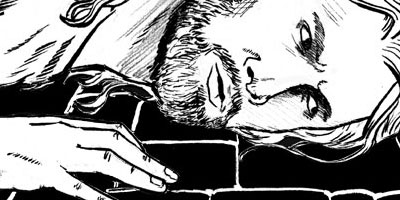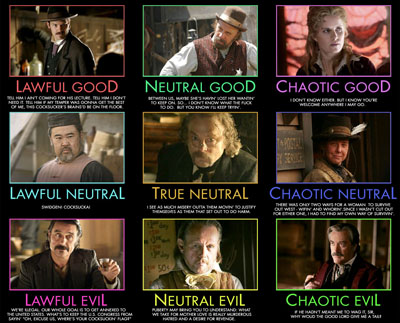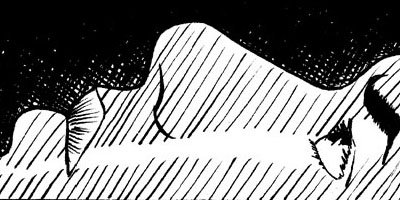My weekly TV column is up at Torontoist.
24
Jan
They should set Dog the Bounty Hunter after THE DEFICIT AMIRITE
Posted by MGK Published in The Internets, TV24
Jan
23
Jan
BEST SUPPORTING ACTRESS: Melissa Leo for The Fighter is basically a lock for a nomination with her Golden Globe win. Amy Adams will get one for the same flick. Helena Bonham Carter will get the nod for The King’s Speech because it’s British and good and the Academy loves it when things are British and good (and is often willing to overlook “good”). Those three are certain; that leaves two slots, which will go to some combination of Mila Kunis and/or Barbara Hershey for Black Swan, Hailee Stanfield for True Grit, and Jacki Weaver for Animal Kingdom. I’m going to bet on Hershey and Weaver; I think Hollywood will decide that Kunis’ work, while good, wasn’t really magnificent, and that Stanfield is perfectly solid but not amazing enough to get the “kid gets the nom” momentum. If I’m wrong, I think Stanfield is the one I’m wrong about.
BEST SUPPORTING ACTOR: Christian Bale’s Fighter performance basically has this award set aside for him already, so it’s really a matter of filling out the other four slots here. Geoffrey Rush gets one for The King’s Speech for the same reason Ethan Hawke got one for Training Day – the movie is basically a two-person movie when all is said and done, and he’s the other person. I think John Hawkes’ turn in Winter’s Bone gets one, simply because he’s an underdog in an underdog film and everybody keeps talking about how he’s an underdog in an underdog film, and frankly I think he deserves the award more than Bale does anyway (and given that I thought Bale’s performance was superb, that should say something). The rest of the pack is Mark Ruffalo for The Kids Are All Right, Jeremy Renner for The Town, Justin Timberlake for The Social Network and Matt Damon for True Grit. (I think the Michael Douglas cancer sympathy train that led to him getting a Golden Globe nomination for Wall Street 2 is finally over.) Out of that pack, I pick Ruffalo and Renner; if I’m wrong about anything, I think it’s Timberlake, who probably snags either Ruffalo’s or Hawkes’ spot.
BEST ACTRESS: Natalie Portman for Black Swan, duh. Annette Bening for The Kids Are All Right, also duh. Jennifer Lawrence for Winter’s Bone, obviously. They are locks. Nicole Kidman for Rabbit Hole seems to be an increasing consensus, although I haven’t seen it and can’t comment as to whether she deserves it. I think Michelle Williams snags the last spot for Blue Valentine, but it might be too racy (gasp) for Academy voters because she blows Ryan Gosling in it so the cynical thing is to say that instead Julianne Moore for Kids or Lesley Manville for Another Year sneak in. (Either of those could also replace Kidman, but I don’t think they will.)
BEST ACTOR: Colin Firth for The King’s Speech is again obvious, as is James Franco for 127 Hours (and I think this is probably the only big nomination the movie gets). Jesse Eisenberg should score a nom for The Social Network. That leaves one slot and there’s a lot of good options: Jeff Bridges for True Grit, Mark Wahlberg for The Fighter, Robert Duvall for Get Low, Ryan Gosling for Blue Valentine, Paul Giamatti for Barney’s Version, maybe even DiCaprio for Inception (although it’s unlikely). My money is on Duvall and Gosling, but Bridges or Wahlberg could upset, because after all Ryan Gosling did play in a movie where he got a blowjob and apparently that’s a big deal now, to admit that people get blowjobs. (Why didn’t this hurt Julia Roberts for Pretty Woman back in the day?)
BEST DIRECTOR: Christopher Nolan for Inception, Tom Hooper for King’s Speech, Darren Aronofsky for Black Swan, and David Fincher for The Social Network are all givens. That leaves one slot and it should go to Debra Granik for Winter’s Bone, but instead will go to either the Coens for True Grit or David O. Russell for The Fighter. Probably the Coens. The Oscars love them some Coens.
BEST PICTURE: Black Swan, The Social Network, The King’s Speech, Inception, True Grit, The Fighter, The Kids Are All Right. Every one of them is certain. The remaining three will come from these five: 127 Hours, Winter’s Bone, Animal Kingdom, Toy Story 3 and The Town. My guess is that Toy Story 3, Winter’s Bone and 127 Hours are the nods here. Honestly, this category has gone from being the most fun to wager on to the least; the ten-picture rule kills the suspense because in any year there’s really only six or seven serious BP contenders.
21
Jan
No, not that Richard Pryor movie. I mean, the toy that was officially The Best Toy Ever when you were a kid. The one that you got for a Christmas, or a birthday, or a Hannukah or a Bar Mitzvah or just a one-time surprise that you never got tired of and that always seems, in memory, to be tinged with a special glow of nostalgia. Does anyone else have one of those?
For me, it was the Death Star Play Station. I got it when I was four, and when fully assembled, it stood almost as tall as I did. It had pretty much everything you needed to recreate the entire Star Wars movie (which I had pretty much memorized by then)…a trash compactor with foam “trash” and a dianoga, which finally gave me a good look at the monster; a bridge that Luke and Leia could swing across; a laser cannon…and the best part, it could all be taken apart and you could play with it piece by piece. You could run around with the laser cannon like it was a toy gun, use the elevator shaft like a bazooka, and everything else a four-year-old’s imagination could come up with. I think it was probably a good four or five years before everything was lost or broken to the point where it wasn’t worth playing with anymore.
Does anyone else have a toy like this? Did anyone else have this specific toy? Feel free to share a piece of your childhood in the comments!
20
Jan

Ghost has become a reasonably popular supporting characters in superhero comics over the past few years. Unfortunately for this Ghost, I’m talking about Marvel’s Ghost, the Iron Man villain and Thunderbolt. DC’s Ghost, on the other hand, languishes in relative obscurity.
Which is a pity because in a lot of ways they’re the same character: scientist/engineer invents phasing thingy, uses it to steal stuff, attracts ire of Forces of Status Quo (Iron Man/Captain Atom), feud ensues. Of course, Marvel Ghost arrived later and with a more inspired creative team (the classic Michelinie/Layton run on Iron Man, versus later Steve Ditko during his Charlton run – and not everything could be Blue Beetle or the Question, frankly, which is one of the reasons Captain Atom has always been the Michael Biehn of superheroes), which made a lot of difference; his gradual shift of emphasis from thief to anticorporate terrorist has helped rejuvenate the character and make him more relevant.
DC Ghost, in comparison, has languished as part of DC’s back catalog. You can almost see the ticket he’s holding in his hand that says “due to be killed off by another supervillain who needs to look badass, 2014.” Because these days that is just how DC rolls; there won’t be any attempt to use the character because someone like Ghost is just a costume to passed from nameless baddy to nameless baddy, like Black Spider or Hyena. It’s a stylistic choice, and not an indefensible one (after all, if you want your story to focus on a hero and his life, the villain can literally be just an empty mask), but I’m not going to pretend I’m fond of the approach.
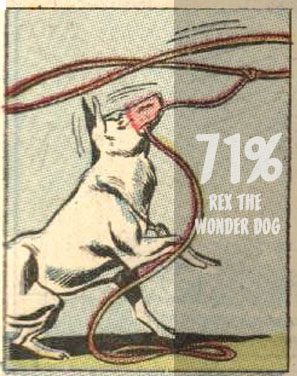
19
Jan
Supposedly Not Improved Archie
Posted by MGK Published in Archie (Improved Or Otherwise), Comics, Interactive Fun Time Party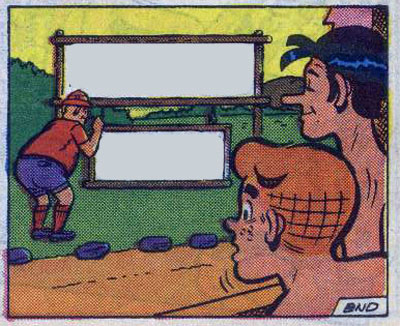
18
Jan
I need alpha testers for a card game I’ve been tinkering with in my spare time which I’ll probably eventually release under a Creative Commons license or similar once balance issues are worked out. If you’re interested – and you have friends willing to put up with you being interested – email me with “Alpha Testing” in the subject line
18
Jan
17
Jan
My weekly TV column is up at Torontoist, and I just want to say that Brett Lamb’s cartoon this week is one of my favorites of all he’s ever done. The happy werewolf cracks me up every time.
17
Jan
14
Jan
Fellow MGK contributor Matthew Johnson posted a couple of weeks ago about his undeniably unfilmable (but interesting) idea for a Doctor Who story, and the comments section turned towards everyone else’s idea for a Doctor Who story they probably couldn’t do. Which, in my case, has perhaps less to do with the story idea and more to do with the fact that I can’t really see the producers of Doctor Who accepting an unsolicited pitch from a novice screenwriter based on his blog post about the idea, but I’ve accepted a long time ago that I have no idea how to break into television. (Television studios, I can do. But that’s another story.)
My idea comes from noticing the pattern that the series has established over its first five seasons in its “Doctor Who meets a famous creative person” episodes (‘The Unquiet Dead’, ‘The Shakespeare Code’, ‘The Unicorn and the Wasp’, ‘Vincent and the Doctor’.) The creative person runs afoul of a menace that is peculiarly fitted to their creative endeavors, with a Doctor Who twist (Dickens meets alien “ghosts”, Shakespeare fights evil witches from another dimension, Agatha Christie wanders into a murder mystery that involves space wasps, and Vincent van Gogh discovers aliens that, due to his unique perception, only he can see.) The menace brings the creative person to a personal low, even as the Doctor finds himself unable to thwart it; he succeeds by using praise to bring out the creative person’s unique gifts, allowing them to defeat the menace in a way the Doctor can’t. Finally, the Doctor reveals a hidden truth to the creative person: Their gifts are unique and their works will endure throughout eternity.
Naturally, I had to subvert the formula. 🙂
In this story, the Doctor and Amy wind up in England, in 1844. The politician and author Edward Bulwer-Lytton is at a personal low, having been forced out of Parliament, separated from his wife, and dealt with the death of his mother…and he’s not handling it well. In fact, he’s having a nervous breakdown, hearing voices that tell him to excavate a massive hole on his estate.
The Doctor finds this highly suspicious. Not because he thinks Edward is insane, but because the TARDIS is picking up high-end telepathic broadcasts that suggest he very much isn’t. He insinuates himself into Edward’s company in order to find out just what’s at the bottom of the hole, and isn’t surprised to find that it’s an alien race. The Vrilya, as they are called, came through from another dimension that was losing its cohesion, and when they escaped, well…beggars can’t be choosers. A portal to a maze of subterranean caverns, with no way up to the surface, still beat a world where the laws of physics were breaking down.
The Vrilya are angelic, intensely powerful, and bring with them a miracle substance that is the pinnacle of their technology, called “vril”. They plan to offer Edward, and by extension Britain, the substance in exchange for a path for the rest of their species to come through. With the prospect of all his shames and failures erased, Edward is sorely tempted.
But the Doctor realizes that vril is more dangerous than it appears. Its energies are actually the cause of the destabilization of the Vrilya’s home universe, and if they begin using vril in large quantities on Earth the way they did back home, well…”unmitigated disaster” barely begins to describe it. The Vrilya don’t take well to what they see as a death sentence for their people (they see life without the miracle of vril as a fate worse than death) and use their powers to banish the Doctor to their universe.
But the Doctor makes contact with Edward through the TARDIS’ telepathic circuits (the ones that let him instantly understand any language.) He convinces Edward that his mind is receptive to the Vrilya, but that link works both ways–he needs to open himself up completely to the Vrilya, let them see the fullness of the human condition as expressed through the mind of one of its most celebrated authors. Startled back to normality by the Doctor’s praise, Edward does so…and unexpectedly, the Vrilya flee back to their home dimension. The Doctor pops out as they pop back in, relieved to be back. “Where did they go?” asks Amy, who really hasn’t had much to do in this episode. “Oh, probably off to try again somewhere else. Anywhere the portals can open. Anywhere that’s not here.”
“And my works, Doctor?” Edward asks. “Will they endure? Will I be remembered, in ages hence?” The Doctor smiles thinly, and assures Edward that the name Bulwer-Lytton will be famous for centuries to come. But unlike Vincent, he decides not to give him a ride in the TARDIS to show him exactly how…
14
Jan
Yes, that IS Harry Shum Jr. and Twitch having a fighty bit.
Posted by MGK Published in It's The Youtube13
Jan
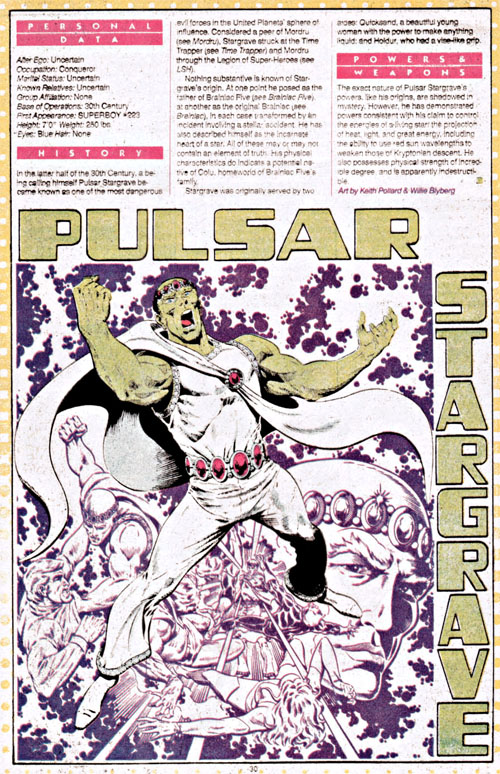
Pulsar Stargrave has always been, to me, one of the criminally underused ideas in Legion history, for a few reasons. He has an awesome name, for starters. He’s got a great look, too: a neo-Roman togacape, dressed in imperial white, give the impression of someone who knows he’s in charge but it’s stripped down enough that you know he can rumble if he wants to do so. And, of course, he’s green, which lets you have an ambiguous tie to Colu and/or Brainiac Five if you want (and you should).
Of course the net result of all this is that Pulsar Stargrave has barely been touched. He’s been used barely at all – and one of those times was in the Legion of Substitute Heroes one-shot where he was more or less just played for laughs by Keith Giffen as a generic Big Bad suitable for antagonizing against Matter-Eater Lad.1 On top of that, his powers are vague in all the wrong ways. He’s Generic 70s Cosmic Baddie and he doesn’t have to be.
I think there’s a lot of potential here that hasn’t been tapped. You can make Pulsar Stargrave Brainiac 7, for example, a Brainiac from the future come to conquer easier temporal targets. Or make him the Anti-Matter Universe’s equivalent of Brainiac 5 – the logical endpoint of what would happen if the smartest person in the universe was completely amoral, self-interested, and power-hungry. (You could also give him an evil goatee that way, and don’t think for a second that this wouldn’t be completely awesome.) The point is that right now Pulsar Stargrave is just waiting for a good idea to show up and use him as its vehicle, and he would make an awesome vehicle in that respect.
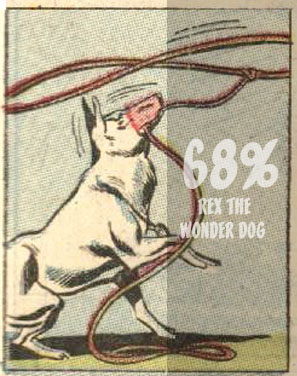
- Did he show up in R.E.B.E.L.S. recently? Did I imagine that? I’m not sure. [↩]
11
Jan
A while back, in the comments section on my post about the five best comics deaths, I asked people to remind me to talk about my Sandman theory. Nobody did in all this time, but I’m going to tell you all about it anyway. This is, quite possibly, the Essence Of Blogging.
This theory has to do with a plot development that, strangely, never seemed to be the subject of much speculation, despite the fact that it would seem to be one of the key developments in the series. Perhaps this is because it happened so late in the series’ run, or because there never seemed to be much chance to get an answer on the topic–apart from a cryptic comment or two in the book’s afterword, I don’t believe Gaiman has ever discussed it. In ‘The Kindly Ones’, Loki and Puck kidnap Daniel Hall, with the apparent intent of driving his mother Lyta mad and sending her on a quest for vengeance against Morpheus. Which, to all intents and purposes, they succeeded magnificently at.
I say “apparent intent”, because it’s clear that they had greater intentions than merely framing Morpheus for kidnapping. They had some sort of plan that involved burning away Daniel’s mortality, leaving just the part of him that gestated in dreams, and they hinted that they were working for someone else. But the identity of the mastermind behind the plan was never uncovered in the series, and to the best of my knowledge, Gaiman has never revealed his or her identity in any subsequent source. So who was it that was behind the plan to abduct Daniel? Who set the events in motion that ended in Morpheus’ tragic death?
I think it was Morpheus.
Think about it. Everyone assumes that Lyta was being irrational for leaping to the conclusion that Morpheus was responsible, but really, how irrational was it? He out and out said, “Take good care of your baby. One day I will come back for it.” The two actual kidnappers were both connected to Morpheus (Loki says, “I will be under an obligation to no-one,” which seems, on the surface, to suggest that he’s getting rid of Morpheus to get out from under his debt…but which could equally mean that he’s performing a service to pay it.) And the plan to burn away Daniel’s mortality does seem to suggest that his gestation in dreams was why he was chosen…exactly why Morpheus was interested in him.
What if Morpheus wanted to take Daniel for some purpose, something that involved burning away the child’s mortality, and “hired” Puck and Loki to do the job? What if they saw it as an opportunity to do mischief to their “employer”, necessitating Morpheus to send the Corinthian after them? And what if, on a subconscious level, he knew the act would be self-destructive? Perhaps he had two plans for Daniel…the plan he let himself know about, and the plan that prepared his successor. “But the stuff you do, where you do it, and you won’t even admit to yourself it’s what you’re doing. What would you call it?” That’s how Death described him, at the end. It fits the theory pretty well, doesn’t it?
Of course, we may never know. As I say, Gaiman’s never explained it. But it’s what I’ll always believe. Dream couldn’t let go of his kingdom the way Destruction did, but he couldn’t go on the way he was. He needed a successor, and found one in the most devious way possible. Death was his escape, and he planned it so meticulously that even he couldn’t stop him.
11
Jan
Things people mutter about and I don’t get
Posted by MGK Published in Nothing Else Fit, The InternetsThis video:
Now, predictably there has been the sort of “oh god those kids don’t know what an eight-track is I’m so old” commentary from around the internets, and that’s… predictable, I guess. But I don’t really see it that way, because other than that one kid who thought the 3.5″ floppy disk was a camera, the kids mostly were dead-on about what these things were. They identified storage media as storage media, the telephone as a telephone – hell, they mostly even figured out what the eight-track was, and honestly I didn’t recognize it as an eight-track until I saw the cassette. (Sure, the one kid thought it was a movie rather than an album, but so what? You can’t tell what’s stored on a piece of storage media until you play it. And anybody laughing at the kids trying to operate the rotary dial phone should think about how much work it took their most tech-unsavvy friend to master their cellphone.)
Hell, when the one kid started turntabling on the kiddie record player that made me feel the opposite of old. Not young, but rather… timeless. Give someone a record player, and they will start scratching with it. We don’t change as much as we think we do, and there’s good in that.
Search
"[O]ne of the funniest bloggers on the planet... I only wish he updated more."
-- Popcrunch.com
"By MightyGodKing, we mean sexiest blog in western civilization."
-- Jenn
Contact
MGKontributors
The Big Board
MGKlassics

Blogroll
- ‘Aqoul
- 4th Letter
- Andrew Wheeler
- Balloon Juice
- Basic Instructions
- Blog@Newsarama
- Cat and Girl
- Chris Butcher
- Colby File
- Comics Should Be Good!
- Creekside
- Dave’s Long Box
- Dead Things On Sticks
- Digby
- Enjoy Every Sandwich
- Ezra Klein
- Fafblog
- Galloping Beaver
- Garth Turner
- House To Astonish
- Howling Curmudgeons
- James Berardinelli
- John Seavey
- Journalista
- Kash Mansori
- Ken Levine
- Kevin Church
- Kevin Drum
- Kung Fu Monkey
- Lawyers, Guns and Money
- Leonard Pierce
- Letterboxd – Christopher Bird - Letterboxd – Christopher Bird
- Little Dee
- Mark Kleiman
- Marmaduke Explained
- My Blahg
- Nobody Scores!
- Norman Wilner
- Nunc Scio
- Obsidian Wings
- Occasional Superheroine
- Pajiba!
- Paul Wells
- Penny Arcade
- Perry Bible Fellowship
- Plastikgyrl
- POGGE
- Progressive Ruin
- sayitwithpie
- scans_daily
- Scary-Go-Round
- Scott Tribe
- Tangible.ca
- The Big Picture
- The Bloggess
- The Comics Reporter
- The Cunning Realist
- The ISB
- The Non-Adventures of Wonderella
- The Savage Critics
- The Superest
- The X-Axis
- Torontoist.com
- Very Good Taste
- We The Robots
- XKCD
- Yirmumah!
Donate
Archives
- August 2023
- May 2022
- January 2022
- May 2021
- January 2021
- December 2020
- October 2020
- June 2020
- March 2020
- January 2020
- December 2019
- October 2019
- February 2019
- January 2019
- December 2018
- April 2018
- March 2018
- February 2018
- January 2018
- December 2017
- November 2017
- October 2017
- February 2017
- January 2017
- December 2016
- November 2016
- October 2016
- September 2016
- August 2016
- July 2016
- June 2016
- May 2016
- April 2016
- March 2016
- February 2016
- January 2016
- December 2015
- November 2015
- October 2015
- September 2015
- August 2015
- July 2015
- June 2015
- May 2015
- April 2015
- March 2015
- February 2015
- January 2015
- December 2014
- November 2014
- October 2014
- September 2014
- August 2014
- July 2014
- June 2014
- May 2014
- April 2014
- March 2014
- February 2014
- January 2014
- December 2013
- November 2013
- October 2013
- September 2013
- August 2013
- July 2013
- June 2013
- May 2013
- April 2013
- March 2013
- February 2013
- January 2013
- December 2012
- November 2012
- October 2012
- September 2012
- August 2012
- July 2012
- June 2012
- May 2012
- April 2012
- March 2012
- February 2012
- January 2012
- December 2011
- November 2011
- October 2011
- September 2011
- August 2011
- July 2011
- June 2011
- May 2011
- April 2011
- March 2011
- February 2011
- January 2011
- December 2010
- November 2010
- October 2010
- September 2010
- August 2010
- July 2010
- June 2010
- May 2010
- April 2010
- March 2010
- February 2010
- January 2010
- December 2009
- November 2009
- October 2009
- September 2009
- August 2009
- July 2009
- June 2009
- May 2009
- April 2009
- March 2009
- February 2009
- January 2009
- December 2008
- November 2008
- October 2008
- September 2008
- August 2008
- July 2008
- June 2008
- May 2008
- April 2008
- March 2008
- February 2008
- January 2008
- December 2007
- November 2007
- October 2007
- September 2007
- August 2007
- July 2007
- February 2007
Tweet Machine
- No Tweets Available
Recent Posts
- Server maintenance for https
- CALL FOR VOTES: the 2021 rec.sport.pro-wrestling Awards
- CALL FOR NOMINATIONS: The 2021 rec.sport.pro-wrestling Awards (the Theszies)
- The 2020 RSPW Awards – RESULTS
- CALL FOR VOTES: the 2020 Theszies (rec.sport.pro-wrestling Awards)
- CALL FOR NOMINATIONS: The 2020 Theszies (rec.sport.pro-wrestling awards)
- given today’s news
- If you can Schumacher it there you can Schumacher it anywhere
- The 2019 RSPW Awards – RESULTS
- CALL FOR VOTES – The 2019 RSPW Awards (The Theszies)
Recent Comments
- George Leonard in When Pogo Met Simple J. Malarkey
- Blob in How Jason Todd Went Wrong A Second Time
- Cindi Chesser in Thursday WHO'S WHO: The War Wheel
- Scott Hater in Bing, Bang, Bing, Fuck Off
- dan loz in Hey, remember how we talked a while a back about b…
- Sean in Server maintenance for https
- Ethan in CALL FOR VOTES: the 2021 rec.sport.pro-wrestling A…
- wyrmsine in ALIGNMENT CHART! Search Engines
- Jeff in CALL FOR VOTES: the 2021 rec.sport.pro-wrestling A…
- Greg in CALL FOR VOTES: the 2021 rec.sport.pro-wrestling A…
